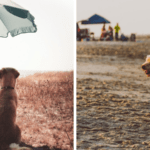This article has been contributed to Dog Furiendly by Mark Webster. Mark is the co-founder of Dog Food Heaven and is passionate about distributing accurate, useful nutritional information for dog owners. Over to you Mark!
Food is certainly an effective way to win a dog’s affections! Practically any owner will sneak a quick bite of “people food” to their pooch on occasion. However, not everything in your kitchen is safe for dogs to eat. Before giving your dog anything from the cupboard, check out this complete guide to dog-safe food.
Dog-Friendly Foods: A Quick Overview
Before diving into the specifics, keep these important rules in mind:
Food for humans is not a substitute for dog food. Only dog food has the correct blend of ingredients to fulfil your dog’s nutritional needs. Also, even healthy human food has limits. Treats should only consist of 10% of a dog’s daily caloric intake.
Finally, never guess whether or not a particular food is safe for your dog. Before giving them any new food, check with your vet or a reputable source online.
As long as you follow these basic rules, there are plenty of foods your dog will enjoy!
Meats
Dogs aren’t shy about their love of meat. Fortunately, most meats are fine to give to your dog, as long as you follow specific guidelines:
Chicken – Deboned, unseasoned chicken is a protein-rich treat for dogs. It’s also gentle on sensitive stomachs. You can bake, broil, grill, or saute the chicken – just avoid anything prepared with large amounts of oil or butter.
Beef – Unsalted beef is another great choice. Feed your dog leaner, bone-free cuts cooked medium or better. For ground beef, cook it at least medium-well to remove any bacteria.
Turkey – Plain turkey is fine for dogs to eat, but first, remove the skin and excess fat. Also, make sure the turkey doesn’t have any bones.
Ham – A bite of ham now and again won’t hurt your dog. However, it has fairly high fat and sodium levels, so don’t use it as a regular treat.
Generally, most meats work well as an occasional treat. The biggest potential problem is bones,
so check every piece of meat thoroughly before giving it to your dog.
Grains
Dogs can eat grains, such as wheat, oat, and rice. They can help aid in digestion.
You’ll find lots of misinformation about grains online and at your local vet’s. In 2007, contaminated pet food from China killed thousands of dogs and cats in the United States. The problem involved industrial chemicals, not grains, but the general public began thinking of grains as harmful to pets.
While grain-free dog food is popular, grains do have some benefits in a dog’s diet. For example:
Wheat gluten contains 80% protein with a digestibility of 99%. Its amino acid profile is similar to meat.
Corn contains essential fatty acids and fibre. It can also help with protein deficiency.
If your dog is currently on a grain-free diet and doesn’t have any issues, there’s usually no need to switch his food. However, the same applies to food with grains. If your dog tolerates it without issue, you don’t need to go grain-free. Plus, food with grains is usually cheaper.
Yoghurt
Many dogs love yoghurt. You can give it to them on a plate or put it in a toy such as a Kong. For even more fun, put the yoghurt-filled toy in the freezer for about 20 minutes before giving it to your dog. Licking frozen yoghurt is an easy and effective way to keep your dog occupied.
However, yoghurt isn’t for every dog. Like people, some dogs are lactose intolerant. Watch for vomiting or diarrhoea.
Only give your dog plain, unflavored yoghurt. Avoid any type with added sugar, artificial sweetener, bits of fruit, or other extras.
Yoghurt has active cultures with probiotics that help boost digestive system functions (for both pups and people). Your vet might recommend giving your dog yoghurt to help ease any mild nausea or upset stomach.
Seafood
Many dogs love a variety of seafood, and for the most part, it’s not harmful. Popular types of seafood you can give dogs include the following:
Salmon – Salmon is an excellent source of protein, amino acids, and healthy fats. However, before giving it to your dog, cook it thoroughly at 145 degrees or higher. Undercooked salmon contains parasites that can cause a variety of digestive issues in dogs.
Shrimp – As with salmon, shrimp is also safe to give your dog as long as it’s fully cooked. Also, make sure to remove the tail, head, and legs. Shrimp contains antioxidants and Vitamin B-12.
Tuna – Small amounts of cooked tuna are safe for dogs. If you’re giving your dog canned tuna, make sure it’s prepared in water instead of oil.
As you can see, the most significant potential issue with seafood is not cooking it properly. Never give your dog even a small amount of undercooked or raw seafood.
Fruits And Vegetables
Perhaps more than any other type of food, dogs tend to have strong personal preferences about fruits and veggies. Some dogs love them all, others enjoy certain types, and still, others won’t eat any. Popular options that are safe for dogs include:
Pumpkin – Both raw and canned pumpkin are excellent sources of fibre. It’s often recommended by vets to treat mild constipation and diarrhoea.
Broccoli – Small amounts provide a healthy boost of nutrients. However, don’t give your dog any excessive amounts of broccoli, as too much can cause gastrointestinal distress.
Green Beans – Another excellent source of vitamins and iron, you can give green beans to dogs. However, only give them fresh or canned beans, and always cook them first. Uncooked beans contain lectin, a protein that can make dogs nauseous.
Carrots – Dogs get several benefits from carrots. They contain lots of vitamins and fibre. Plus, chewing on raw carrots helps clean your dog’s teeth.
As with any food, always check the suitability of any type of fruit or vegetable before giving it to your dog.
Foods To Avoid
Not all foods are safe for dogs, and some can even cause serious illnesses or even death. Never feed your dog the following:
Chocolate – A substance called methylxanthine found in chocolate can cause vomiting, diarrhoea, seizures or sudden death. Never feed your dog even a tiny amount of chocolate.
Cinnamon – Fortunately, cinnamon isn’t toxic to dogs, but eating it is an incredibly unpleasant experience. Cinnamon typically causes mouth pain, impaired heart functions and difficulty breathing.
Xylitol – This artificial sweetener is toxic to dogs. It’s found in gum, sugar-free peanut butter, toothpaste, and many other products. (Natural peanut butter without xylitol is safe for dogs.)
Take care when eating any of these foods or using any of these products. Even small amounts can be harmful, and some dogs move fast when something is dropped on the floor.
Bite-Size Advice
If you’re looking for dog-safe food, tons of options are available. Meat is a classic favourite, but your dog can also safely eat a variety of fruits, vegetables, grains, and other common foods. Plus, many dog safe foods are packed with vitamins, aid digestion, or otherwise benefit your furry friend.
No matter what types of “people food” you give your dog, always keep the amounts small. Your dog’s main diet should consist of dog food. However, as long as you follow the safety tips above, your dog can also enjoy many different types of tasty treats.
What is your pooches favourite tasty but healthy treat? let us know in the comments! For more dog food related articles head to Dog Furiendly.












I love my vegetables as a tasty low-calorie treat! And i’m always eyeing up any meat on my humans plate, luckily they will sneak me a tid bit if we are ever dining out to keep me quiet 😉
As our dog quite literally eats anything, we are always sharing our food with him. Any form of meat and he goes wild for it!